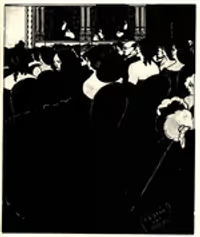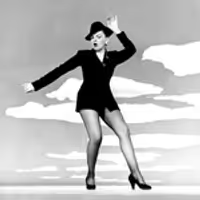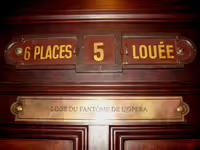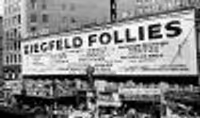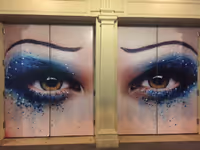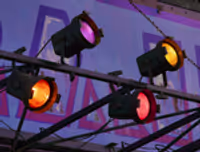Could Broadway survive if all shows just theoretically dropped prices?
#1Could Broadway survive if all shows just theoretically dropped prices?
Posted: 11/2/22 at 9:17am
Please note that I am (clearly) no expert in economics, but I'm curious...
Whenever the state of the industry is discussed, one of the top "problem" areas that we hear is that ticket prices are too expensive for most people. If shows just theoretically dropped their prices to be more affordable, or further more, if the general public theoretically banded together and just absolutely refused to buy tickets they deemed as "too expensive", what would that actually do in the Broadway world?
I know the likelihood of this actually happening is zero, but I'm just genuinely just curious as to what would happen.
#2Could Broadway survive if all shows just theoretically dropped prices?
Posted: 11/2/22 at 9:32am
No. A few points about this:
- Broadway shows are budgeted (capitalization and weekly running costs) relative to ticket prices. If a show costs $700K a week to run and you price all the seats at $50 to try to move them, you don’t have a prayer of recouping or even breaking even, not when you have so many union members and fixed expenses. And production costs have ballooned post-Covid for several reasons.
- Common belief is: if you price previews at a blanket low price, then you run the risk of too many people taking advantage and then it doesn’t translate into full price sales down the line. You quickly lose the sheen of a luxury item. Shows try to sell at the highest price point, and when that doesn’t work they reduce. I don’t know if that’s RIGHT, but that’s what’s done.
- There will always be people looking to pay premium prices for the best experience. The number of people and the price point varies per show. That’s healthy when we’re working within the confines of capitalism, and commercial theatre will never be divorced from capitalism. Accepting it is going to be better for your mindset.
- There is already diversity of pricing in the marketplace for every show except the biggest of big hits. On TDF alone there are 14 Broadway shows up right now. Plus other discounts and outreach to cultural groups and such.
- The shows doing poorly are not a huge surprise, with a few exceptions; they would have struggled in any season proportionate to the hits. Certain titles have no problem selling tickets at a higher price.
As we get into the inevitable recession, it will be interesting to see what happens, because risktaking is often the first thing to go. It’s scary. But these are the realities of a system where every union member needs to get paid a living wage, and where investors expect an attempt at ROI. Something like STRANGE LOOP or K-POP being such evident financial failures (tho one has the opportunity to bounce back) doesn’t bode well for the future of risktaking.
#3Could Broadway survive if all shows just theoretically dropped prices?
Posted: 11/2/22 at 9:45am
ErmengardeStopSniveling said: "No. A few points about this:
- Broadway shows are budgeted (capitalization and weekly running costs) relative to ticket prices. If a show costs $800K a week to run and you price all the seats at $50 to try to move them, you don’t have a prayer of recouping or even breaking even, not when you have so many union members and fixed expenses."
Just to play devils advocate, would it even be possible to attempt to start making Broadway shows less expensive to run moving forward? How would that even work if that was a goal?
#4Could Broadway survive if all shows just theoretically dropped prices?
Posted: 11/2/22 at 9:48am
Re risk taking. There are plenty of non-profits across the country that foster "riskier" or more experimental works. Broadway isn't the be all & end all of theatre.
Coming from a city where it often feels like everything put on stage must be an experimental work espousing a fringe political view, it is refreshing to go to Broadway & see something with a broader appeal that doesn't feel like a lecture.
#5Could Broadway survive if all shows just theoretically dropped prices?
Posted: 11/2/22 at 9:56am
SomeOtherMe said: "Just to play devils advocate, would it even be possible to attempt to start making Broadway shows less expensive to run moving forward? How would that even work if that was a goal?"
Shows do that upfront by slashing the cast size, band size, number of costume changes, reducing weekly advertising budgets, etc.
(and in the Covid era, shows are hiring additional swings, and spending thousands per week on testing & safety protocols.)
When things get tough, there’s what are called waivers: the key service providers and stakeholders agree to waive their weekly royalties/fees for X number of weeks, to reduce running costs in the hope of being able to break even each week and eventually bounce back. If things get even worse, shows might opt to take out a Priority Loan: a loan to sustain the show and make up for losses, which is paid back before money goes to the investors of the initial capitalization. That’s often a waste: Gent’s Guide and Smokey Joe’s are two of the only Bwy shows in history who took out priority loans and ultimately recouped.
Broadway61004
Broadway Legend Joined: 4/14/11
#6Could Broadway survive if all shows just theoretically dropped prices?
Posted: 11/2/22 at 10:00am
The big thing to remember is that shows make their money off the expensive seats. By that, I mean, that's their target--get a handful of people to buy the really expensive seats and that makes up for everything else. They'd much rather have a 60% full house that included 5% of the people paying $400 a ticket than a full house where everyone pays $50. It's the same concept as casinos--the nickel slot players are just there to supplement the income they get from the 100 people betting $1,000 a hand. So as much as it seems like lowering ticket prices will help shows run longer, while they will fill more seats, they actually won't be as profitable. Shows are fine running at 50% capacity if they're making money. But even if they have 90% capacity and are losing money, the number of people seeing it is irrelevant.
#7Could Broadway survive if all shows just theoretically dropped prices?
Posted: 11/2/22 at 10:25am
There’s an argument to be made that Equity minimums should be on a sliding scale that rises with the show’s gross, and differences between pre-recoup and post-recoup rates. But that disadvantages the actors & SMs in new shows that aren’t selling well.
hearthemsing22
Broadway Legend Joined: 2/14/20
#8Could Broadway survive if all shows just theoretically dropped prices?
Posted: 11/2/22 at 10:38am
Would dropping prices increase interest in smaller shows? Or would it just make people go to big name shows i.e. Wicked, Hamilton, etc. because the prices are lower and then the smaller, lesser known shows wouldn't have a chance?
No. I don't believe so.
JasonC3
Broadway Legend Joined: 4/22/21
#9Could Broadway survive if all shows just theoretically dropped prices?
Posted: 11/2/22 at 11:15am
As I checked in for a recent flight to the UK, I was offered the chance to upgrade to first class for $599 more about $1000 less than had I bought a first class ticket originally. For a good night's sleep that allowed me to immediately hit the ground running, I bit and it was completely worth it.
Have any Broadway shows done something comparable? Tried a targeted offer close to the performance to entice people to upgrade their seats?
It's discounting of sorts, but not public, and not necessarily to the masses unless that is their desire. Plus it keeps the public "asking price" anchored in people's minds which from a marketing/pricing standpoint is more desirable than a discounted price becoming the comparison or expectation.
#10Could Broadway survive if all shows just theoretically dropped prices?
Posted: 11/2/22 at 11:38am
Not exactly the same thing, but there is something Aladdin tried where they offered you a free upgrade if you switched your ticket to a less desirable showtime. They had premium seats they knew they wouldn't be able to sell at full price for less desirable showtimes, but knew they could sell other seats at full price for the more desirable showtime.
#11Could Broadway survive if all shows just theoretically dropped prices?
Posted: 11/2/22 at 11:39am
A few things to remember:
Broadway is not a single business; it's simply a joint marketing entity. Each show is on its own bottom so when we speak of doing anything we are talking about the failures, not the successes. That said, some producers are willing to take greater risks because they made a fortune on another show. It is beyond preposterous to suggest that there is no risk or experimentation going on on Broadway. That requires putting your head in the sand. Shows that are in trouble try lots of things to survive. Yes there may be new ideas (like the upgrade one) that could be tried perhaps but you can't budget a show to lose money. Likewise, you could reduce costs at least a little but the expense is what people come to see (and I don't mean just fancy sets and costumes, but talent at the highest level). People don't travel to New York to see 50 buck shows. The bottom line is we have always had a lot of failure and that's a part of the process. We have also had huge successes. Dynamic pricing and discounting is a big part of the strategy, but not giving away what you don't have to.
#12Could Broadway survive if all shows just theoretically dropped prices?
Posted: 11/2/22 at 11:40am
JasonC’s point is interesting. I just don’t think the ticketing systems are sophisticated enough for this.
Right now, people get filled into the best open seats through like…TDF and TKTS and other platforms where seats are chosen day-of.
#13Could Broadway survive if all shows just theoretically dropped prices?
Posted: 11/2/22 at 12:37pm
Unfortunately, lowering prices to entice a greater number of sales isn't a detailed enough solution to boost profits for shows that currently aren't making money. Any given must at least make some profit to stay open for an indefinite amount of time.
However, I live outside NYC and prioritize seeing shows I know I can have access to as inexpensive a ticket as possible. When I come in for my next trip every six months, I'll see 5-8 shows and how much the cheapest possible ticket is really does factor into my decision of what to see.
I realize accommodating budget theatre-goers like me isn't a practical way to make a show profitable. I do think there are further initiatives that could help though. At the end of day, I believe that selling a $40 rush ticket to someone in a seat that would otherwise go unoccupied is better than making $0 from someone unwilling to pay $100-250 for the same (or a similar) ticket.
Let me propose another solution:
What if there was a standard practice where all tickets on Broadway (yes, all) became $40 starting 40 minutes to the start of a performance? Similar to a rush line, but with added rules:
- One per person
- Cash only (to expedite sales)
- No negotiation on seating location - you get what you get, take it or leave it
- Once you buy your ticket, you must go directly into the theatre and take your seat
No exceptions to the above rules. It's similar to TDF and TKTS programs, but it's less cost prohibitive and it's the most efficient and direct way to fill seats and get more money into the pockets of shows.
Take a look at Chicago, for example. They had 2,700 unsold tickets last week. They've recouped; breaking even is a win for them. Could you imagine if they flipped those into $40 tickets minutes to curtain and brought in another $108,000 last week? That fills the seats with people who you never would have got in the door in the first place while adding $100K to your weekly gross.
This isn't perfect, I know. Maybe it's $60 at 60 minutes to curtain. Maybe it's not every show so the blockbusters keep charging their $150-200 average price.
But if every show (with the capacity to sell excess inventory) did an extra 500 tickets per week, that would have added an extra to $520,000 to the grosses on Broadway last week, and an extra 13,000 audience members attending.
This will never happen. My broad point is if selling inexpensive tickets was a real priority for producers to spur sales, increase attendance and make a smaller but more consistent profit, it wouldn't be a hard system to implement.
#14Could Broadway survive if all shows just theoretically dropped prices?
Posted: 11/2/22 at 12:56pm
Lumiere2 said: "Let me propose another solution:
What if there was a standard practice where all tickets on Broadway (yes, all) became $40 starting 40 minutes to the start of a performance? Similar to a rush line, but with added rules:
- One per person
- Cash only (to expedite sales)
- No negotiation on seating location - you get what you get, take it or leave it
- Once you buy your ticket, you must go directly into the theatre and take your seat
No exceptions to the above rules. It's similar to TDF and TKTS programs, but it's less cost prohibitive and it's the most efficient and direct way to fill seats and get more money into the pockets of shows.
Take a look at Chicago, for example. They had 2,700 unsold tickets last week. They've recouped; breaking even is a win for them. Could you imagine if they flipped those into $40 tickets minutes to curtain and brought in another $108,000 last week? That fills the seats with people who you never would have got in the door in the first place while adding $100K to your weekly gross."
I think this is a great idea - imperfect, yes, but like you said - you can either make an additional $100k or sit on empty seats (which also impacts the overall performance and sometimes moral of the house). Something like this may not completely change the landscape, but it could definitely help push us further along. A lot of things in this business need to change, and it’ll only happen if small adjustments are made along the way…
#15Could Broadway survive if all shows just theoretically dropped prices?
Posted: 11/2/22 at 1:30pm
Yes Hogan hits the nail on the head.
Also have to remember that MOST shows are playing the long game. You don’t want to sell a $60 ticket today if you could get $150 for it next week or next month. And this is tied into Broadway being a luxury good.
Shows like Tina have used the strategy of “limit discounting; if people want to see it they can pay full price or TKTS rate.” That can have mixed results but I bet Tina yielded higher grosses than if they saturated the market with discounts for the same period of time.
#16Could Broadway survive if all shows just theoretically dropped prices?
Posted: 11/2/22 at 1:46pm
No, it couldn't survive. Looking at Broadway demographics, the majority of people who attend have plenty of disposable income and they will pay top dollar to see the new, hot thing. Broadway can't be accessible to all, the math doesn't work unfortunately.
#17Could Broadway survive if all shows just theoretically dropped prices?
Posted: 11/2/22 at 1:53pm
GiantsInTheSky2 said: "Lumiere2 said: "Let me propose another solution:
What if there was a standard practice where all tickets on Broadway (yes, all) became $40 starting 40 minutes to the start of a performance? Similar to a rush line, but with added rules:
- One per person
- Cash only (to expedite sales)
- No negotiation on seating location - you get what you get, take it or leave it
- Once you buy your ticket, you must go directly into the theatre and take your seat
No exceptions to the above rules. It's similar to TDF and TKTS programs, but it's less cost prohibitive and it's the most efficient and direct way to fill seats and get more money into the pockets of shows.
Take a look at Chicago, for example. They had 2,700 unsold tickets last week. They've recouped; breaking even is a win for them. Could you imagine if they flipped those into $40 tickets minutes to curtain and brought in another $108,000 last week? That fills the seats with people who you never would have got in the door in the first place while adding $100K to your weekly gross."
I think this is a great idea - imperfect, yes, but like you said - you can either make an additional $100k or sit on empty seats (which also impacts the overall performance and sometimes moral of the house). Something like this may not completely change the landscape, but it could definitely help push us further along. A lot of things in this business need to change, and it’ll only happen if small adjustments are made along the way…"
This would make a LOT of ticket buyers simply wait for the line...having even fewer buyers of full price tickets. You are also assuming that every theater would suddenly be selling out but at a quarter of the price. They won't.
#18Could Broadway survive if all shows just theoretically dropped prices?
Posted: 11/2/22 at 2:16pm
Now, this probably doesn't sound sustainable. What I would absolutely support though would be more shows to do $35 tickets for student rush an hour before curtain during previews. This could really help get the feet of future full price buyers into the broadway doors by giving them the ability to be exposed to a wide range of shows. This program would be in addition to the "box office open" rush, just an hour before curtain, and the only people to qualify would be public k-12 students and all university/college students. These people would be the demographics most necessary to grasp to get them into theatre, and then in the future when those young people get older and wealthier (after attending college), they can then see shows full price and have all the broadway memories from youth as well. Student ID would be required too.
This could be sustainable to fill empty seats, if all else isn't.
JasonC3
Broadway Legend Joined: 4/22/21
#19Could Broadway survive if all shows just theoretically dropped prices?
Posted: 11/2/22 at 2:17pm
ErmengardeStopSniveling said: "JasonC’s point is interesting. I just don’t think the ticketing systems are sophisticated enough for this.
Right now, people get filled into the best open seats through like…TDF and TKTS and other platforms where seats are chosen day-of."
I bet you're right that current ticketing systems not fully capable of doing something like this ... or at least with the level of micro-targeting that might be ideal.
Knowing that the best seats often go to TKTS or TDF the day of sis what made me think the upgrade option might be a great approach ... reward someone who has already been by bumping them up versus offering a higher priced seat at a deeper discount.
And since the original purchase price is already a sunk cost, an invitation to upgrade for say $40-$60 (just making up a number here that somewhat reflects a typical TDF price) might seem like a real bargain.
#20Could Broadway survive if all shows just theoretically dropped prices?
Posted: 11/2/22 at 2:23pm
Broadway61004 said: "They'd much rather have a 60% full house that included 5% of the people paying $400 a ticket than a full house where everyone pays $50."
I'm not sure I completely agree with this. I think there's PR damage to be done by continually playing to a house with a considerable number of empty seats. It just doesn't look good and I think it can make those who do attend feel uncomfortable, even if subconsciously, as if those empty seats represent people who knew something that the buyers didn't.
"Michael Riedel...The Perez Hilton of the New York Theatre scene"
- Craig Hepworth, What's On Stage
#21Could Broadway survive if all shows just theoretically dropped prices?
Posted: 11/2/22 at 2:49pm
It is just greed. Once producers found out with Hamilton that audience members had $400 to spend on a ticket all of the prices increased. Obviously, if the enormous Phantom of the Opera can run for 20 years with $79 balcony tickets (sometimes $39) there is no reason Back The Future needs to charge $175 for the last row at the Broadway. Remember to factor in the reduction in cast and orchestra size as well as bonuses given to producers of not-for-profits which used to be sometimes $1 million in addition to their salary. Roundabout, which does not pay actors production contract salary for the first three months, I am looking at you. Of course ticket prices could be slashed in half and there would still be profit enough to send the kids to private schools. Union salaries have not increased 12% in the last 10 years and yet ticket prices have tripled. Yes you, Back to the Future without a star but with a $368 non-premium orchestra box office price plus $16 fee. Greed.
#22Could Broadway survive if all shows just theoretically dropped prices?
Posted: 11/2/22 at 3:02pm
Mike Costa said: "It is just greed. Once producers found out with Hamilton that audience members had $400 to spend on a ticket all of the prices increased."
And IMHO, that's why Cameron Mackintosh is closing Phantom. Current thinking is that shows that can't routinely sell "premium" seats at $400-$500 aren't "profitable".
"Michael Riedel...The Perez Hilton of the New York Theatre scene"
- Craig Hepworth, What's On Stage
#23Could Broadway survive if all shows just theoretically dropped prices?
Posted: 11/2/22 at 3:15pm
Thing is Hamilton ticket prices were selling for over $2000 in the resale market back in summer 2016. That’s why their producers increased premium tix prices to $850 back then so they would keep more of the money rather than have those profits go to ticket resellers.
I hope producers of hits like Hamilton, Wicked, Lion King, and even Phantom are hopefully reinvesting their profits for new Broadway works. Even if those new works fail, they still get income from those other long-running hits every single week.
#24Could Broadway survive if all shows just theoretically dropped prices?
Posted: 11/2/22 at 3:16pm
You are so right, Cameron is a smart producer. Why would anyone go to the expense of producing the enormous Phantom of the Opera with sets costumes and an orchestra when you can charge the same ticket price for SIX? The gullible audience will pay the full price even though there are only six actor salaries and costumes on the stage. The public has proven they do not know the difference and that is what producers are banking on. The current Funny Girl has half the chorus and orchestra as the original and no one seems to notice. The Yiddish Fiddler on the Roof revival is using non-union musicians. Greed.
#25Could Broadway survive if all shows just theoretically dropped prices?
Posted: 11/2/22 at 3:27pm
It feels like Broadway shows are priced as an event which has changed the theatre going experience.
Videos




